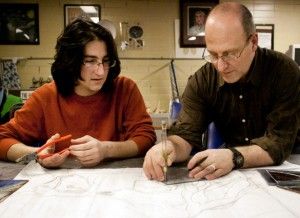Résumé experience, thereapeutic activities offered at Craft Shop

February 14, 2012
Splattering soft clay onto a spinning wheel, smelling the thick scent of sawdust floating in the air while hammering nails into wood or soldering hot metals together to frame cut glass can all be experienced at one of the Student Center Craft Shop’s workshops.
The Craft Shop gives the opportunity to create a variety of arts and crafts at a low cost and offers instruction in many areas. The experience of instructing the Craft Shop workshops, which may reflect the skills students need during their careers, has come to benefit some SIUC graduates.
Ron Dunkel, Craft Shop coordinator, said teaching the workshops has made a difference for students when looking for a job because they build bullet points for their résumés.
Advertisement
“Students who have taught workshops, graduated and gotten hired, have had their employers say they chose them because they’ve had that teaching experience working with the public,” Dunkel said.
The wages of teachers of the workshops come from the Student Center budget, which is funded by tuition fees, said Don Castle, Student Center Programs associate director.
He said parts of the budget consist of fees and operational revenue, which help run the Craft Shop because it is not a profit-making area.
The cost to participate in the workshops, as well as the separate materials and services sold at the Craft Shop, function as cost-recovery measures, Castle said.
Most of the time, the workshop fees collected by the Craft Shop bring in enough funding to offset the cost of the materials per participant, Dunkel said.
“If a student is knitting a hat, the cost of the yarn is calculable so we can include that cost within the workshop fee,” Dunkel said. “The problem in doing this for some workshops such as woodworking is that the cost can be incalculable. A participant can build a tiny wooden box or an eight-foot-tall entertainment center, and there’s a cost difference between some scrap pieces of wood and $50 plywood sheets.”
Dunkel said the workshops must also meet a minimum enrollment number in order to be held.
Advertisement*
The decision on which workshops to have comes from the interest expressed by the student body and the community, Dunkel said.
“We try to mix things up and have some variety each semester, but mainly it’s dependent on instructors,” Dunkel said. “We have to have a quality instructor, so if we get somebody who is interested, they fill out their proposal and we determine if they have the skills.”
If the proposal is accepted, the Craft Shop staff works with the instructor to create a syllabus and determine the fees needed for the workshop, he said.
Aside from scheduled workshops, the Student Center Craft Shop also offers a variety of walk-in activities.
There are many reasons students should consider coming to the Craft Shop, Dunkel said. Also, because the shop offers a variety of activities, it can reach a broad group of students and community members, he said.
He said the shop could be a place for people to continue artwork they began in high school but haven’t had many chances to explore within their declared majors.
The Craft Shop can also be a place to seek some therapy, or stress-relieving moments, during the week, he said.
The shop also offers students help with class assignments such as in architecture and art classes, Castle said.
Desiree Handley, a senior from Andalusia studying studio arts, said the shop is often an open studio where students and community members can come to work on projects.
Along with the available help, the Craft Shop can help students and community members save money when creating arts and crafts. It also offers the use of larger, more expensive equipment, such as pottery wheels and mat cutters, and it also provides services such as framing.
Dunkel said it would be more expensive to fund a project from a craft store, especially for projects requiring the technical equipment.
“The reason I think students should get involved is that these things are lifelong hobbies and they’re healthy things to do,” Dunkel said. “Students are developing habits for life, so why not develop healthy and rewarding habits?”
Advertisement







